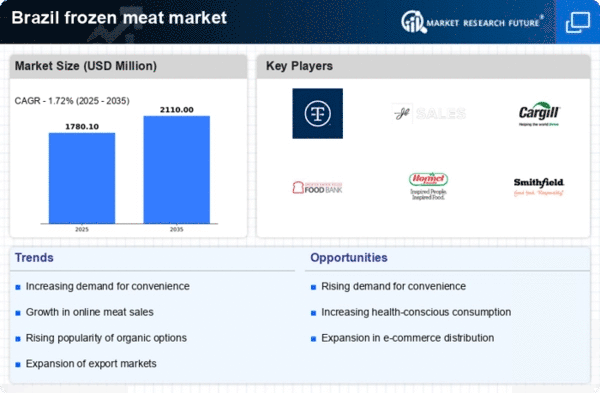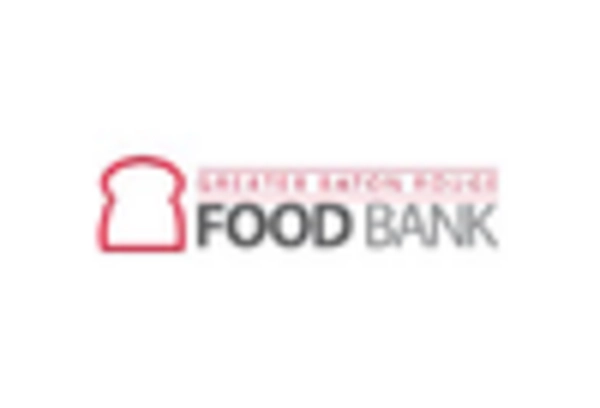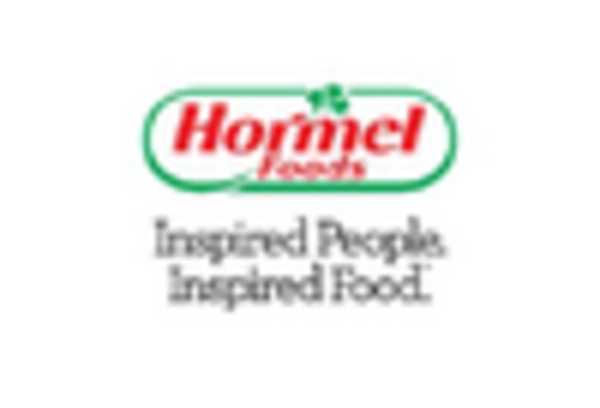Export Potential and International Demand
Brazil's position as a leading exporter of meat products presents a substantial opportunity for the frozen meat market. The country has established itself as a key player in the global meat trade, with exports accounting for a significant portion of production. Recent statistics indicate that Brazil's meat exports have increased by approximately 15% over the past year, driven by rising international demand. The frozen meat market stands to benefit from this export potential, as producers seek to meet the needs of foreign markets. This growth in exports may lead to increased production capacity and investment in the frozen meat sector, further solidifying Brazil's status in the global market.
Rising Health Consciousness Among Consumers
There is a noticeable increase in health awareness among Brazilian consumers, which is influencing their purchasing decisions in the frozen meat market. Many consumers are now more inclined to choose frozen meat products that are perceived as healthier alternatives, such as lean cuts and organic options. This trend is supported by data indicating that approximately 30% of consumers prioritize nutritional value when selecting frozen meat. The frozen meat market is adapting to this demand by offering a wider range of health-oriented products, which may enhance consumer trust and loyalty. As health consciousness continues to rise, the market is expected to expand further.
Increasing Urbanization and Lifestyle Changes
The ongoing trend of urbanization in Brazil appears to be a significant driver for the frozen meat market. As more individuals migrate to urban areas, their lifestyles evolve, often leading to a preference for convenience in food preparation. This shift is reflected in the growing demand for frozen meat products, which offer quick meal solutions without compromising on quality. According to recent data, urban consumers are increasingly opting for frozen meat due to its longer shelf life and ease of storage. The frozen meat market is likely to benefit from this demographic shift, as busy urban dwellers seek efficient meal options that align with their fast-paced lives.
Growth of E-commerce and Online Grocery Shopping
The rise of e-commerce platforms in Brazil is significantly impacting the frozen meat market. With more consumers turning to online grocery shopping, the accessibility of frozen meat products has improved dramatically. This shift is evidenced by a reported increase of over 40% in online grocery sales in recent years. The frozen meat market is capitalizing on this trend by enhancing online visibility and offering home delivery services, which cater to the convenience-seeking consumer. As e-commerce continues to grow, it is likely that the frozen meat market will expand, reaching a broader audience and increasing overall sales.
Technological Advancements in Freezing Techniques
Technological innovations in freezing methods are playing a crucial role in shaping the frozen meat market in Brazil. Advanced freezing techniques, such as flash freezing, help preserve the quality and flavor of meat products, making them more appealing to consumers. This advancement not only enhances the taste but also extends the shelf life of frozen meat, which is vital for both retailers and consumers. The frozen meat market is likely to see increased sales as these technologies become more widespread, allowing for better product quality and safety. As a result, consumers may be more inclined to purchase frozen meat products, knowing they are receiving superior quality.
















